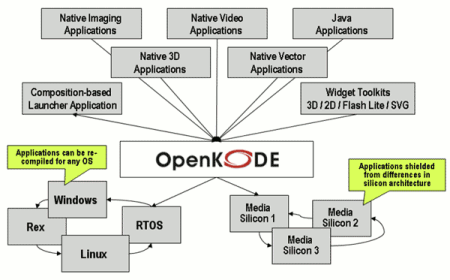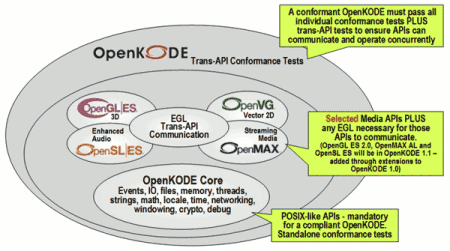Mobile multimedia API gains traction
Feb 13, 2008 — by Eric Brown — from the LinuxDevices Archive — views The Khronos Group formally released the OpenKODE 1.0 API, touted as a royalty-free, device-appropriate alternative to Microsoft's DirectX collection of multimedia APIs. Linux-compatible commercial implementations were announced by Ideaworks3D and Acrodea, while NVidia, Aplix, and Antix Labs have also announced… support.
The Khronos Group formally released the OpenKODE 1.0 API, touted as a royalty-free, device-appropriate alternative to Microsoft's DirectX collection of multimedia APIs. Linux-compatible commercial implementations were announced by Ideaworks3D and Acrodea, while NVidia, Aplix, and Antix Labs have also announced… support.
(Click for larger view of the OpenKODE 1.0 architecture)
By defining a set of advanced media capabilities expected to be consistently available on compatible devices, the OpenKODE spec aims to increase native source code portability — particularly for mobile games — across device operating systems that include Linux, Brew, Symbian, Windows Mobile, WIPI, and RTOS-based platforms. The spec was released for public comment in 2005, and positioned as an “open” alternative to Microsoft's DirectX API collection.
The royalty-free OpenKODE spec combines several native, C-language APIs into a unified media stack specification. Like Java, OpenKODE includes a small runtime, but it is not a virtual machine, says the company. Binaries are said to run natively on each supported platform. Yet, game developers can target a single OpenKODE-compatible API, rather than the native APIs of specific platforms.

Typical OpenKODE environment
(Click to enlarge)
OpenKODE provides a Core API designed to abstract operating system resources. This lightweight abstraction layer will seem familiar to POSIX and C programmers, says Khronos, which claims that it minimizes source changes when porting applications. The core also supports multi-threading under an event-driven architecture, says the group, and the core library is typically under 100KB.
OpenKODE also bundles several royalty free C-language APIs developed by Khronos and made available through the EGL 1.3 inter-API rendering interface. These include OpenGL ES, a 2D/3D graphics library, and OpenVG, a vector graphics library. Subsequent releases of the OpenKODE spec will integrate the OpenSL ES sound library and OpenMAX codec interface.

OpenKODE conceptual diagram
(Click to enlarge)
Although OpenKODE 1.0 is not open source, the Khronos Group announced that it is collaborating with the FreeKODE Project to create an open source version.
Additionally, the following companies made announcements this week regarding commercial OpenKODE implementations:
- Ideaworks3D — The first Linux implementation of OpenKODE is being made available by Ideaworks3D, which is releasing its cross-platform Airplay development technology on Linux, Symbian, BREW, and Windows Mobile. Airplay is a run-time execution environment that delivers a single application binary across all ARM-based mobile devices, says the company. Airplay is said to enable over-the-air deployment to multiple OSes and run-time environments without further porting or need for additional graphics rendering engines. According to Ideaworks3D, Airplay is the only implementation of OpenKODE that provides a single native application binary that can be deployed unmodified to all supported platforms.
- Acrodea — Acrodea, which recently joined the LiMo (Linux Mobile) Foundation, announced it is releasing development versions of OpenKODE 1.0 for Windows and Mac OS X, available here. The Japanese company, which develops UI middleware for mobile phones, plans to follow up with ports of OpenKODE to Linux and BREW, and said that the Linux port would happen “soon.”
- NVidia — NVidia announced it is implementing OpenKODE on its new NVidia APX 2500 mobile-device system-on-chip (SoC), but only for Windows Mobile. Still, Nvidia is a member of the Google Android project, and rumor has it that the fabless semiconductor firm has been showing off the APX 2500 running on an Android-based prototype.
- Aplix — Aplix announced plans to integrate OpenKODE support into its product portfolio, including its JBlend Java virtual machine software, which it claims has been deployed in “more than 397 million handsets.” Aplix recently announced plans to develop a LiMo-based phone called Opal.
- Antix Labs — This mobile game company is supporting the OpenKODE spec on versions of its Game Player client for the Symbian-based Motorola UIQ platform.
Stated Tim Renouf, OpenKODE systems architect at Antix Labs, “The fragmented, device-specific nature of native multimedia content has been destroying the mobile industry's economics; OpenKODE takes major steps to reduce that fragmentation and encourages publishers and developers to improve and deploy more attractive services.”
Stated Diogo Teixeira, project manager for FreeKODE, “We see OpenKODE as an effort to close a critical gap in the consolidation of cross-platform native multimedia development. FreeKODE aims to provide free OpenKODE implementations for a variety of platforms with the help of the open-source community.”
Stated analyst Jon Peddie of Jon Peddie Research. “The usability of the Apple iPhone has already had a major impact on the mobile industry, and now consumers demand compelling and highly functional user interfaces and applications which, in turn demand highly-integrated graphics acceleration architectures. Khronos is to be applauded for creating an open standard that not only tackles the problem of mobile platform fragmentation head on, but also delivers an open architecture that can provide a low-level media processing foundation for a wide range of software platforms. ”
Availability
The OpenKODE 1.0 specification, a white paper, and other information are available for download here. Khronos has released a conformance test suite for OpenKODE 1.0 to enable use of the OpenKODE trademark. Created by Futuremark Corporation, the test is available through the Khronos Group OpenKODE Adopters program.
The Linux- and OpenKODE-compatible Airplay 3.5 software development kit (SDK) is now available for evaluation from Ideaworks3D .
This article was originally published on LinuxDevices.com and has been donated to the open source community by QuinStreet Inc. Please visit LinuxToday.com for up-to-date news and articles about Linux and open source.